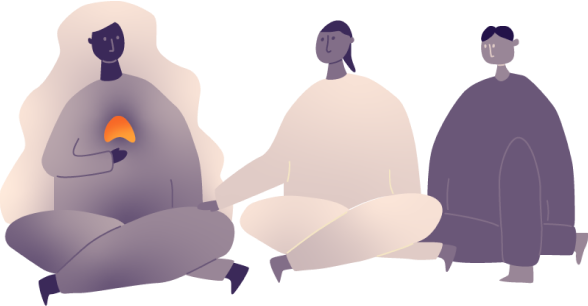Awhi is still in development, we'd love your feedback and suggestions. Let us know.
How can I support my teenager to explore their sexuality?
How can I support my teenage disabled and/or neurodivergent child to explore their sexuality?
Spots, pubic hair, infatuations, rejection, confusion, blood in your knickers, spontaneous erections, and sticky sheets. These are all speedbumps on the road to becoming a fully sexual human being, which most of us put up with and may even be proud of, as they track our transition from childhood to adulthood.
Puberty is a time when we get an inkling of who we may be in this world, how we fit in, and who we might want to share it with.
Most children will be told about the mechanics of puberty before they start hitting those milestones – what periods are, how our bodies will change, what this means for our fertility. But the real angst and confusion goes beyond these physical changes, and this is where your child may really need your support.
All too often disabled and/or neurodivergent young people are left out of conversations amongst peers on exploring gender roles, early sexual experiences, romantic aspirations. Sometimes they do not have access to formal relationship and sex education at schools either.
If you think this may be the case for your child, it may be up to you to let your child know you support and respect their right: to explore their sexuality; to decide what gender they identify with, to pursue intimate relationships; to masturbate in the privacy of their own home.
This may not sound easy, but it is important to lay the foundations for honest and open conversations about sex and relationships as early as possible.
Don’t make the mistake of thinking just because your child hasn’t shown any overt interest in sex, puberty or relationships, that they’re not interested. Sexuality and relationship advice and information are relevant to _all _young people.
If we arm our children with accurate knowledge and self-respect for their bodies and their sexuality, and with the communication skills to let us know how they’re feeling, we are protecting them against abuse and exploitation. We are also letting them know we believe they are deserving of positive, healthy, and happy sexual and romantic relationships.
In 1986 British campaigner Ann Craft identified three sexual rights for intellectually disabled people.
- The right to know (about sex).
- The right to be sexual.
- The right not to be sexually abused.
She was ahead of her time and since then, the right to marry, have children and be sexual has been enshrined in the United Nations Convention on the Rights of Persons with Disabilities
Key messages we need our children to_ hear_
- We respect and acknowledge their right to become sexual, independent human beings.
- We are there to support them with love, information, and a willing ear for whatever they’re feeling or going through.
- We recognize their right to make decisions about how they wish to express their gender and their individuality. Disabled and neurodivergent young people are as likely to identify as LGBTQ+ as anyone else - in fact, some surveys have shown neurodivergent people are more likely to be gender non-conforming, gender diverse, or transgender. They may need our help in articulating this aspect of themselves.
- Allow them to take necessary risks which will build their confidence and self-esteem.
- Enable them to make decisions about their personal care, especially regarding intimate care.
- Let them know it is normal to have sexual and romantic feelings. It is also normal to experience pain and frustration if those feelings are not requited. Help them to name and process these feelings.
- Support them in developing connections, friendships, and relationships independently from us.
- Enable them to advocate for themselves and their right to be a sexual citizen.
- Avoid telling them sex is only possible within a loving relationship, as this can lead to confusion and negative self-perceptions.
- Above all make sure they know they are deserving of love, connection, and respect.
Key things we need to do
- Provide our children with opportunities to be alone with their peers and to develop independent relationships.
- Make sure your child has the communication skills to say ‘no’. This means saying ‘no’ to any touch or intimate contact they dislike. It also means saying ‘no’ to unwanted relationships and knowing how to end a relationship. If they're non-speaking - a firm hand in the stop position or making verbal noises is important.
- Instill crucial life skills – how to have good personal hygiene, how to be less reliant on adults and be more independent.
- Make sure they know the difference between public and private, especially when it comes to expressing their sexuality.
- Teach them the social rules around sexual behaviour and respecting other people’s boundaries.
- Communicate with your child’s school - discuss any areas of concern and ensure they are supporting your child as you would like. For example, if your child likes to express their gender in a way that's different to the socially expected way their gender is stereotypically expressed, make sure their school has an appropriately tolerant and accepting culture.
Lastly don’t underestimate how important these issues may be for your child. Trying to protect your child from sex and relationships won’t work. Your child has the right to grow up – and inevitably pain, heartbreak and difficulties come with the territory.
Good conversations around sexuality and relationships will lay the foundations for growth and aspirations for the future.
With your help, your child can discover exactly who they are and be proud of that person.
For more on puberty, the following articles are available on Awhi Nga Matua.
· How can I help my disabled/autistic child navigate the emotional storms of puberty?
· My teenager wants to have a boyfriend/girlfriend, but I think they might get hurt - what can I do?
· Help! My teenager is using pornography and I don’t know what to do
· Help! How can I teach my disabled/autistic teenager that good hygiene is important?
· How can I help my disabled/autistic child manage their periods?
· Help! How can I teach my child what's okay and what's not, when it comes to masturbation?
· My child is going through puberty – what is appropriate for their intimate care plan?
· How can I help my disabled child with their body image?
To read about one young person's experience of re-discovering their sex life after a spinal cord injury, read here . . www.allisforall.com/amplify/lived-experiences/turn-me-on-navigating-sex-after-a-spinal-cord-injury
'Why are you so obsessed with my sex life? Disability and Dating, is a podcast by Auckland-based disability advocates Olivia Shivas and Rebecca Duder - read the transcript here . . .www.interactives.stuff.co.nz/2021/08/whats-wrong-with-you-podcast/transcript/WWWY-Episode-4-Dating-transcript.pdf
You might also find the resources below useful, which includes books from the IHC Library as well as helpful website and helpline numbers. Or contact the IHC library direct to have a chat about what you need on 0800 442 442 or email: Librarian@ihc.org.nz.
Kids’ Books from the IHC Library
· Things Ellie Likes – A book about sexuality and masturbation for girls and young women with autism and related conditions - Kate E. Reynolds, illustrated by Jonathan Powell
· _Things Tom Likes _– A book about sexuality and masturbation for boys and young men with autism and related conditions - Kate E. Reynolds, illustrated by Jonathan Powell
· Growing Up Great! The Ultimate Puberty Book for Boys – Scott Todnem
· The Growing Up Guide for Girls – What Girls on the Autism Spectrum Need to know! - Davida Hartman, illustrated by Margaret Anne Suggs
· Secret Boys' business – second edition - Rose Stewart, Fay Angelo, Heather Anderson, illustrated by Jeff Taylor
· _More Secret Girls’ Business _- Rose Stewart, Fay Angelo, Heather Anderson, illustrated by Jeff Taylor
· _Special Girls’ Business _– This book has been written for girls with special needs - Rose Stewart, Fay Angelo, Heather Anderson, illustrated by Julie Davey
· Special Boys’ Business – This book has been written for boys with special needs - Rose Stewart, Fay Angelo, Heather Anderson, illustrated by Jeff Taylor
· _Puberty and Special Girls – This book has been written for girls with special needs - _Rose Stewart, Fay Angelo, Heather Anderson, illustrated by Jeff Taylor
· The Autism-Friendly Guide to Periods – Robyn Steward
· Boyfriends + Girlfriends – A guide to dating for people with disabilities – Terri Couwenhoven
· Leroy Learns about the Big 'P'** **- John Hibbs
· _The Boys’ Guide to Growing Up _– Choices and Changes during Puberty – Terri Couwenhoven
· All about Growing Up – Family Planning NZ
· _The Girls’ Guide to Growing Up _– Choices and Changes in the Tween Years – Terri Couwenhoven
Books for Adults from the IHC Library
· When Young People with Intellectual Disabilities and Autism Hit Puberty – A Parents' Q&A Guide to Health, Sexuality and Relationships – Freddy Jackson Brown, Sarah Brown
· _Safety and Consent for Kids and Teens with Autism or Special Needs – A Parents’ Guide – Debra S. Jacobs
· Sexuality – Your Sons and Daughters with Intellectual Disabilities – Karin Melberg Schwier, Dave Hingsburger
· _ The Facts of Life and More – Sexuality and Intimacy for People with Intellectual Disabilities – Leslie Walker-Hirsch
· _Masturbation, Autism and Learning Disabilities – A Guide for Parents and Professionals _– Mel Gadd
· Sex and Relationships Education for Young People and Adults with Intellectual disabilities and Autism -Dr Kelly Asagba, Professor Jan Burns, Dr Sophie Doswell
· Hygiene and Related Behaviours for Children and Adolescents with Autism Spectrum and related Disorders - Kelly Mahlere
· Relationship Building and Sexual Awareness for Kids with Autism – Susan Heighway, Susan Kidd Webster
· Sexuality and Learning Disabilities – A Handbook - edited by Claire Bates
· Sexuality and Intellectual disabilities – A guide for Professionals – Andrew Maxwell Triska
· Let's Talk about Sex - Dr Sarah Ashworth, Dr Hannah Carton
· Intellectual disability and the right to a sexual life – A Continuation of the Autonomy/Paternalism Debate - Simon Foley
** **
DVDs from the IHC Library (also available for online streaming)
· Tara Grows Up – A guide to periods and puberty for young women with intellectual disabilities - IHC
· Billy Grows Up – A guide to puberty for boys and young men with intellectual disabilities -IHC
** **
Helpful websites:
KidsHealth: www.kidshealth.org.nz/sexual-behaviour-children-young-people
Rainbow Youth: www.ry.org.nz
Healthify He Puna Waiora: www.healthify.nz/health-a-z/c/consent/
Body Image Movement: www.bodyimagemovement.com
Nest Consulting: www.nestconsulting.nz/healthy-relationships/student-qa/
All is for All: www.allisforall.com
Anxiety NZ: www.anxiety.org.nz
Skylight: www.skylight.org.nz
Depression NZ: www.depression.org.nz
Helplines:
Anxiety New Zealand: 0800 269 4389 (0800 ANXIETY)
1737: Free call or text 1737 to talk to a trained counsellor
Depression.org.nz: 0800 111 757 or text 4202
Kidsline (for people up to 18 years): 0800 543 754
Whats Up (for 5 to 18-year-olds): 0800 942 8787
thelowdown.co.nz , Web chat, email chat or free text 5626
Youthline: 0800 376 633, free text 234, email talk@youthline.co.nz
Lifeline: 0800 543 354
Samaritans: 0800 726 666
Suicide Crisis helpline: 0508 828 865 (0508 TAUTOKO)
Resources
When young people with intellectual disabilities and autism hit puberty :
When young people with intellectual...
"Written for parents and carers of young people with an...
"Written for parents and...
When young people with intellectual disabilities and autism hit puberty :
When young people with intellectual...
"Written for parents and carers of young people with an...
"Written for parents and...
Safety and Consent for Kids and Teens with Autism or Special Needs :
Safety and Consent for Kids and Teens with...
"The developmental challenges of children with special needs means...
"The developmental...
Safety and consent for kids and teens with autism or special needs :
Safety and consent for kids and teens with...
"The developmental challenges of children with special needs means...
"The developmental...
Sexuality :
Sexuality :
Parents describe the joy and challenges of raising children with an...
Parents describe the joy...
The facts of life ...and more :
The facts of life ...and more :
Gives social workers, teachers, and direct support professionals...
Gives social workers,...
Masturbation, autism and learning disabilities /
Masturbation, autism and learning...
"Intimate self-touch and masturbation can pose many difficulties...
"Intimate self-touch and...
Masturbation, Autism and Learning Disabilities :
Masturbation, Autism and Learning...
"Intimate self-touch and masturbation can pose many difficulties...
"Intimate self-touch and...
Sex and relationships education for young people and adults with intellectual disabilities and autism /
Sex and relationships education for young...
"[This book] provides practical guidance for professionals working...
"[This book] provides...
Hygiene and related behaviors for children and adolescents with autism spectrum and related disorders :
Hygiene and related behaviors for children...
"This book will be very helpful to many ASD parents who need a...
"This book will be very...
Relationship building and sexual awareness for kids with autism :
Relationship building and sexual awareness...
"STARS 2 is an adapted version of the original STARS guidebook that...
"STARS 2 is an adapted...
Sexuality and learning disabilities :
Sexuality and learning disabilities :
"This brand-new edition of our best-selling handbook, brings the...
"This brand-new edition of...
Sexuality and intellectual disabilities :
Sexuality and intellectual disabilities :
"This book provides a concise overview of sexuality and gender...
"This book provides a...
Let's talk about sex /
Let's talk about sex /
"Let's Talk About Sex is a sexual health education programme manual...
"Let's Talk About Sex is a...
Intellectual disability and the right to a sexual life :
Intellectual disability and the right to a...
"One of the perennial political/philosophical questions concerns...
"One of the perennial...
Tara grows up :
Tara grows up :
A short film about puberty designed to be watched by girls and...
A short film about puberty...
Billy grows up :
Billy grows up :
"Billy Grows Up" is a short film about puberty designed to be...
"Billy Grows Up" is a short...
Autism friendly periods
Autism friendly periods
Website of Robyn Steward author of "The autism friendly guide to...
Website of Robyn Steward...
Modibodi Period Panties
Modibodi Period Panties
NZ website of the Australian company that sells absorbent underwear...
NZ website of the...
AWWA Period Underwear
AWWA Period Underwear
Commercial website of the New Zealand company that sells underwear,...
Commercial website of the...
Body Image Movement
Body Image Movement
Website of the Body Image Movement. The site includes background...
Website of the Body Image...
KidsHealth :
KidsHealth :
New Zealand website that gives a brief guide to parents on the...
New Zealand website that...
Rainbow Youth
Rainbow Youth
New Zealand advocacy organisation. From the website - "We work...
New Zealand advocacy...
Healthify He Puna Waiora.
Healthify He Puna Waiora.
The Healthify website, formerly Health Navigator provides one place...
The Healthify website,...
Nest Consulting
Nest Consulting
New Zealand website. This link is to student question and answers...
New Zealand website. This...
Anxiety NZ :
Anxiety NZ :
"Anxiety New Zealand Trust supports people living with anxiety and...
"Anxiety New Zealand Trust...
Skylight Trust :
Skylight Trust :
Skylight Trust supports people of all ages throughout New Zealand...
Skylight Trust supports...
Depression NZ
Depression NZ
"This website helps New Zealanders recognise and understand...
"This website helps New...

Resources for kids
Things Ellie likes :
Things Ellie likes :
"A simple picture book to teach girls and young women with autism...
"A simple picture book to...
Things Ellie likes :
Things Ellie likes :
"A simple picture book to teach girls and young women with autism...
"A simple picture book to...
Things Tom likes :
Things Tom likes :
"A simple picture book to teach boys and young men with autism or...
"A simple picture book to...
Things Tom likes :
Things Tom likes :
"A simple picture book to teach boys and young men with autism or...
"A simple picture book to...
Growing up great! :
Growing up great! :
"Growing Up Great is a body-positive guide to getting through...
"Growing Up Great is a...
The growing up guide for girls :
The growing up guide for girls :
"The Growing Up Guide for Girls is a one-stop guide for young girls...
"The Growing Up Guide for...
Secret boys' business /
Secret boys' business /
Secret boys' business assists boys to understand the changes that...
Secret boys' business...
More secret girls' business
More secret girls' business
This is a companion volume to "Secret Girls Business". In addition...
This is a companion volume...
Special girls' business
Special girls' business
Takes a girl and her carer step by step through the process of...
Takes a girl and her carer...
Special boys' business
Special boys' business
This book has been written for boys with special needs. It supports...
This book has been written...
Puberty and special girls
Puberty and special girls
"Provides practical information about growing up and will help...
"Provides practical...
The autism-friendly guide to periods /
The autism-friendly guide to periods /
Written by autistic author Robyn Steward, this is a detailed guide...
Written by autistic author...
The autism-friendly guide to periods /
The autism-friendly guide to periods /
Written by autistic author Robyn Steward, this is a detailed guide...
Written by autistic author...
Boyfriends & girlfriends :
Boyfriends & girlfriends :
"Boyfriends & Girlfriends is for parents and professionals caring...
"Boyfriends & Girlfriends...
Leroy learns about the big P :
Leroy learns about the big P :
"This unique young person's book has been developed by a very...
"This unique young person's...
The boys' guide to growing up :
The boys' guide to growing up :
"As a sexuality educator, I applaud Terri for tackling this crucial...
"As a sexuality educator, I...
All about growing up
All about growing up
"This workbook has been designed for young people living with mild...
"This workbook has been...
The girls' guide to growing up :
The girls' guide to growing up :
"Puberty is a challenging time for all young adults. Now girls with...
"Puberty is a challenging...
.jpg&w=128&q=75)
Meryl Richards
I’m Meryl Richards. What a pleasure it’s been to join the Awhi team. I get to spend my days researching information that supports me as a parent, and sometimes challenges me to rethink what I thought I knew. My hope is that it will be useful to you too. I live in Kapiti with my partner and two teenage boys, and spend as much time as possible in the surrounding bush and at the beach.
Was this resource helpful to you?


The Awhi Ngā Mātua team would like to thank Takai, the IHC Foundation and the Dines Family Charitable Trust for their generous contributions to our work. A huge thank you also to the IHC Programmes team, in particular the IHC Library which has worked so hard to make their remarkable collection available to us.




.jpg&w=3840&q=75)




